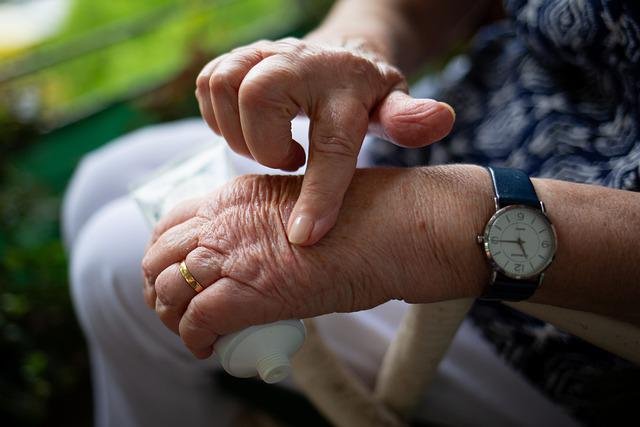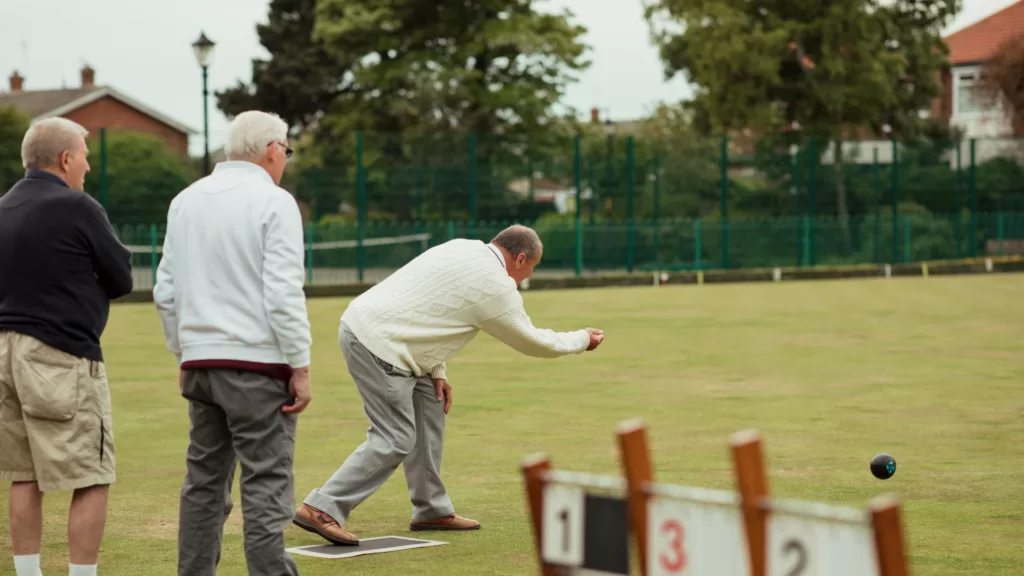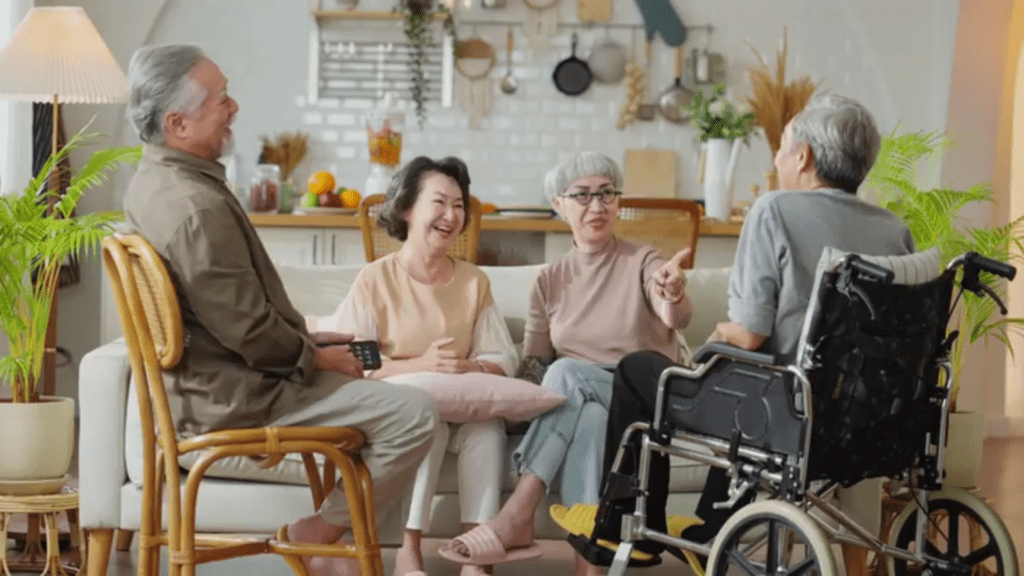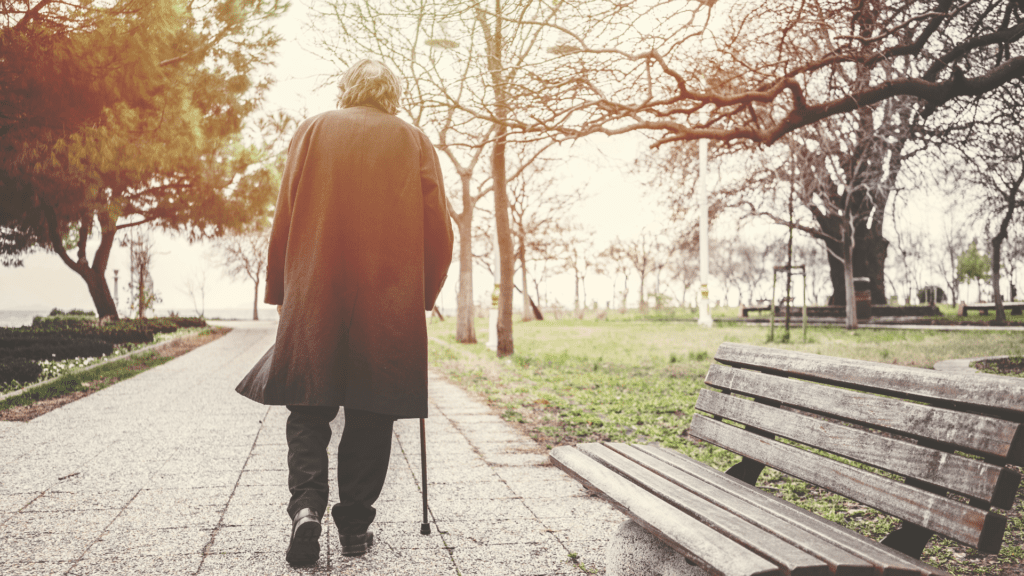
Tips for Seniors with Skin Fragility & Other Problems.
The ageing process causes a variety of changes in the skin, necessitating a personalised approach to skincare for seniors.
One of the most significant changes is a reduction in collagen production.
Collagen, a protein that provides structure and elasticity to the skin, depletes with age, resulting in thinner, less resilient skin.
This decrease in collagen contributes to wrinkle formation and sagging, emphasising the need for products that can stimulate collagen synthesis or provide external collagen support.
Another critical consideration is the slowing of cell turnover. Cells regenerate every 28 days in young skin, but the process slows dramatically as we age.
The result is a buildup of dead skin cells, which can cause a dull complexion and uneven texture.
Physical and chemical exfoliants can help promote cell turnover and keep skin looking younger.
However, to avoid irritation in already sensitive skin, choose gentle formulations.
Decreased oil production is another common problem with elderly skin. Sebaceous glands become less active with time, resulting in drier skin that is more prone to cracking and irritation.
Moisturisers containing hydrating ingredients such as hyaluronic acid, glycerine, and ceramides are essential for maintaining skin hydration and barrier function.
Emollients can also help to retain moisture and provide a barrier against environmental stressors.
Recognising these changes is critical in meeting the unique needs of elderly skin.
Customised skincare routines that include collagen-boosting, cell turnover-enhancing, and deeply hydrating products can significantly improve the skin’s appearance and health.
Furthermore, understanding the unique challenges that senior skin faces enables better prevention and management of common issues like dryness, sensitivity, and susceptibility to damage.
Common Skin Concerns for Seniors and How to Address Them:
1. Dry Skin: Dry skin is a prevalent issue among seniors due to the skin’s reduced ability to retain moisture.
a. This condition can lead to itchiness, flakiness, and discomfort. To combat dry skin, it is important to use gentle, fragrance-free cleansers and apply a rich moisturizer daily.
b. Emollients containing ingredients like ceramides and hyaluronic acid can help lock in moisture.
c. Additionally, maintaining adequate hydration by drinking plenty of water is essential.
2. Age Spots: Age spots, also known as liver spots, are small, darkened areas on the skin that appear due to prolonged sun exposure.
a. While they are generally harmless, they can be a cosmetic concern. To prevent age spots, using a broad-spectrum sunscreen with an SPF of at least 30 is crucial.
b. For existing age spots, over-the-counter creams containing ingredients like hydroquinone, glycolic acid, or retinoids can help lighten them.
c. In more persistent cases, dermatological treatments such as laser therapy or chemical peels may be effective.
3. Thinning Skin: Thinning skin is a natural part of aging, making it more susceptible to bruising and injury.
a. To protect thinning skin, it is advisable to wear protective clothing and be cautious with activities that might cause harm.
b. Using gentle skincare products that do not strip the skin of its natural oils can also help maintain skin integrity.
c. Nutritional support, including adequate intake of vitamins C and E, can further promote skin health.
4. Wrinkles and Sagging Skin: Wrinkles and sagging skin result from the loss of collagen and elastin, proteins that provide structure and elasticity to the skin.
a. While these changes are inevitable, certain practices can help minimize their appearance.
b. Regular use of sunscreen can prevent further damage.
c. Topical treatments containing retinoids, peptides, and antioxidants can stimulate collagen production and improve skin texture.
d. Additionally, maintaining a healthy lifestyle, including a balanced diet rich in antioxidants and regular exercise, can support overall skin health.
Early detection and proactive care are essential for managing these common skin concerns in seniors.
By incorporating these strategies into their daily skincare routine, seniors can keep their skin healthier and more resilient as they age.
Dry Skin in the Elderly: Causes and Solutions.
Our skin changes over time, and dry skin is a common problem among seniors.
Decreased oil production is a significant contributor to this condition. The sebaceous glands, which produce oil, become less active over time, resulting in decreased natural lubrication for the skin. The decrease in oil production makes the skin more susceptible to dryness, flaking, and irritation.
Environmental factors also influence the prevalence of dry skin among the elderly.
Exposure to harsh weather conditions, such as cold winds and low humidity, can dehydrate the skin.
Indoor heating during the winter months exacerbates dryness by lowering the moisture content of the air.
Additionally, prolonged sun exposure can damage the skin’s barrier, resulting in increased moisture loss and dryness.
Underlying health conditions can also cause dry skin in seniors. Conditions such as diabetes and hypothyroidism can impair the skin’s ability to retain moisture.
Certain medications, such as diuretics and anticholinergics, can cause dry, itchy skin.
It is critical for seniors to be aware of these potential contributors and manage them properly under the supervision of healthcare professionals.
Combating Dry Skin.
Seniors can combat dry skin with a variety of effective solutions. Using humidifiers in the home can help maintain proper humidity levels, preventing the skin from drying.
Choosing the right moisturiser is also important; products containing ceramides, glycerine, and hyaluronic acid can help seal in moisture and keep the skin hydrated.
Applying these moisturisers right after bathing can increase their effectiveness.
Maintaining proper hydration is essential for good skin health. Seniors should drink plenty of water throughout the day to keep their skin soft and hydrated from the inside out.
A well-balanced diet rich in omega-3 fatty acids, which can be found in foods such as fish and flaxseeds, can also help to keep skin hydrated and healthy.
Understanding the causes of dry skin and implementing these solutions allows seniors to effectively manage and alleviate this common problem, ensuring their skin remains healthy and comfortable as they age.
Dealing with Age Spots on the Skin.
Age spots, also known as liver spots or solar lentigines, are flat, brown, grey, or black spots that develop on the skin as a result of prolonged sun exposure over time.
These spots are most commonly found on sun-exposed areas of the body, such as the face, hands, shoulders, and arms.
Although age spots are generally harmless, they can cause cosmetic issues for many seniors.
The primary cause of age spots is an overproduction of melanin, the pigment that gives skin its colour.
As we age, our skin’s ability to regenerate and repair itself weakens, making it more vulnerable to the effects of ultraviolet (UV) radiation from the sun.
The cumulative sun exposure causes the development of these spots, which can vary in size and number.
Preventative measures are critical in managing age spots. The most effective way to prevent them is to protect your skin from UV rays.
This can be accomplished by using broad-spectrum sunscreen with an SPF of at least 30, seeking shade during peak sunlight hours, and dressing in protective clothing like wide-brimmed hats and long sleeves.
Furthermore, including antioxidants like Vitamin C and E in your skincare routine can help combat free radical damage, which contributes to the formation of age spots.
There are several treatment options available to reduce the appearance of age spots.
Topical creams containing hydroquinone, retinoids, and glycolic acid can help to lighten age spots.
Laser therapy and intense pulsed light (IPL) treatments are also effective at identifying and breaking down pigmented cells, resulting in a more even skin tone.
Natural remedies for age spots include aloe vera, apple cider vinegar, and lemon juice, though their effectiveness varies.
Consulting with a dermatologist or a doctor who specialises in skin care are excellent options for determining the best treatment plan based on our individual skin type and condition.
With proper care and preventative measures, age spots can be effectively managed, allowing seniors to maintain healthy, radiant skin.
Thinning Skin in Seniors: Prevention and Care.
Ageing causes noticeable changes in skin structure and function, the most significant of which is skin thinning.
This condition is caused primarily by the breakdown of collagen and elastin, two essential proteins that give skin its firmness and elasticity.
As the production of these proteins declines with age, the skin becomes more fragile and vulnerable to bruising and injury.
Long-term exposure to ultraviolet (UV) radiation, which accelerates the degradation of collagen and elastin fibres, can exacerbate thinning skin in seniors.
Other contributing factors include hormonal changes, particularly a decrease in oestrogen levels in postmenopausal women, and the natural loss of subcutaneous fat, which serves as a cushion and support for the skin.
I’ve heard that long-term use of medications like corticosteroids can contribute to skin thinning.
There are several ways to protect and care for thinning skin. First and foremost, wearing protective clothing is strongly advised.
Long sleeves, wide-brimmed hats, and gloves can protect the skin from potential harm and UV rays.
Additionally, applying high-SPF sunscreen on a regular basis can provide additional protection against sun damage, which is critical in preventing further degradation of skin integrity.
Gentle cleansing methods should be used to avoid exacerbating skin fragility. To maintain the skin’s natural moisture barrier, use mild, fragrance-free cleanser and lukewarm water.
Harsh soaps and hot water can deplete the skin’s essential oils, causing dryness and increased vulnerability to injury.
Incorporating specific skin-strengthening products into your daily skincare routine can also help.
Moisturisers with hyaluronic acid, glycerine, and ceramides help to retain moisture and improve skin barrier function.
Topical retinoids, used under the supervision of a healthcare professional, can stimulate collagen production and improve skin thickness over time.
Furthermore, antioxidant-rich serums, particularly those containing vitamins C and E, can help fight oxidative stress and improve overall skin health.
Seniors can effectively manage thinning skin by understanding the causes and implementing these preventive measures, lowering their risk of bruising and injury while also maintaining healthier, more resilient skin as they age.
Wrinkles and Sagging Skin: Effective Treatments.
One of the most noticeable changes in our skin is the appearance of wrinkles and sagging. These changes are primarily caused by elasticity loss and the long-term effects of gravity.
The skin’s ability to produce collagen and elastin, two essential proteins that keep the skin firm and smooth, decreases with age.
Furthermore, external factors such as sun exposure, pollution, and lifestyle choices can exacerbate these changes.
Fortunately, there are several treatment options available for wrinkles and sagging skin.
Non-invasive procedures are popular because they require little downtime and produce significant results. Dermal fillers, for example, can restore volume and smooth wrinkles by injecting substances such as hyaluronic acid into the skin.
Botox, another popular treatment, works by temporarily paralysing the underlying muscles, which reduces the appearance of fine lines and wrinkles.
There are numerous skincare products that aim to firm and tighten the skin. Retinoids, which are derived from Vitamin A, are known for their ability to stimulate collagen production and accelerate cell turnover, resulting in smoother, more youthful-looking skin.
Peptides, another important ingredient, stimulate collagen and elastin synthesis, which improves skin firmness and elasticity.
Antioxidants, such as Vitamin C and E, protect the skin from free radical damage and aid in its natural repair processes.
Those seeking a more holistic approach must maintain a healthy lifestyle. Adequate hydration, a well-balanced diet high in nutrients, and regular exercise can all have a significant impact on skin health.
Protective measures, such as wearing sunscreen every day and quitting smoking, can also help to reduce the negative effects of environmental factors on the skin.
Combining these treatments with lifestyle changes can effectively combat wrinkles and sagging skin, allowing seniors to maintain a more youthful and vibrant appearance.
Individualizing a skincare regimen and consulting with a dermatologist can result in personalised solutions for optimal skin health.
Essential Skin Care Products for Seniors.
Choosing the right skin care products is critical to maintaining a healthy and vibrant complexion. Moisturisers, anti-aging serums, gentle cleansers, and sunscreen are all essential skincare products for mature skin.
These products are specifically designed to meet the unique needs of elderly skin, which frequently becomes drier, thinner, and more sensitive.
Moisturisers are an essential part of any senior skincare regimen. Look for products with hydrating ingredients like hyaluronic acid, glycerine, and ceramides.
These ingredients help to retain moisture, increase skin elasticity, and form a protective barrier against environmental aggressors.
A thick, nourishing moisturiser can significantly improve skin comfort and appearance, particularly when used on a consistent basis.
Anti-aging serums are another important component that frequently include potent ingredients such as retinoids, peptides, and antioxidants.
Retinoids, for example, can increase cell turnover while reducing the appearance of fine lines and wrinkles.
Peptides promote collagen production, which helps to keep the skin firm. Antioxidants like vitamin C and E protect against free radical damage, which can hasten ageing.
Including an anti-aging serum in your skincare routine can result in noticeable improvements in skin texture and tone.
Gentle cleansers are required to avoid depriving the skin of its natural oils. Seniors should use non-foaming, hydrating cleansers that remove impurities without causing dryness or irritation.
Ingredients like aloe vera, camomile, and oat extract can soothe and calm the skin, making cleansing a gentle but effective step in skincare.
Sunscreen is a must-have for people of all ages, including seniors. Daily use of a broad-spectrum sunscreen with at least SPF 30 is essential for protecting the skin from harmful UV rays, which can exacerbate signs of ageing and increase the risk of skin cancer.
Sunscreens containing zinc oxide or titanium dioxide are especially beneficial due to their gentle and non-irritant properties.
Choosing the appropriate skincare products can have a significant impact on the health and appearance of senior skin. Seniors can achieve a more resilient and radiant complexion by focusing on nourishing and moisturising ingredients.
Consistency is essential in skincare. Maintaining a daily routine ensures that the skin receives ongoing care and benefits from the active ingredients in the products.
Adjustments may be necessary based on changing skin conditions or seasonal variations, so it is important to listen to your skin’s needs and adapt accordingly.
Living With Paper Thin Skin.
If you have paper thin skin, you have probably seen what happens when you graze, scratch, or cut their skin.
Even the toughest person would cringe at the wounds that can be sustained, and it’s frightening how frail we become as we age.
Some of us will experience significant skin changes as we get older. You’ll notice it gradually becoming drier, thinner, more delicate, and less elastic.
The fragility of our skin should not be underestimated, as it only takes a minor bush against something like a rose thorn to get our skin ripped open far too easily, so take extreme caution when gardening.
You should keep a close eye on your skin tone, as it may change and you may develop unsightly brown spots.
Years of cumulative sun exposure can cause both benign growths and skin cancers. Medication and chronic medical conditions can make skin more vulnerable to bleeding and bruising.
Sun exposure has a significant effect on the appearance of the skin. Areas of our bodies that are constantly exposed to the sun, such as our arms and legs, are more prone to developing dark spots than areas that are almost always covered, such as the chest and stomach.
Elasticity loss may accelerate, and the skin may look weathered.
Avoid the Sun during peak periods and cover up.
The last thing you want to do in your golden years is make it too easy for the sun to harm you, so always wear long-sleeved pants and shirts, a hat, and sunscreen when you’re out in the sun.
It’s a good idea to get out into the garden early in the morning and finish any work you need to do in the un-shaded areas of your yard before 10 to 11 a.m.
Spend as little time as possible under the midday sun. The sun’s rays are strongest between 10 a.m. and 4 p.m.
After a healthy lunch, work only in your yard’s shaded or covered areas.
Skin cancer is common in seniors, and we all know people who have had so many removed that it seems routine for them.
Skin cancer clinics in Australia are undoubtedly busy treating both melanoma, which can be fatal, and non-melanoma cancers such as basal and squamous cell carcinoma.
Melanoma screening every six months is essential for people aged 70 and up. Epiluminescence microscopy, also known as dermoscopy, is a non-invasive medical procedure that detects melanoma early.
A doctor can use a handheld device to examine the patterns of size, shape, and pigmentation in pigmented skin lesions.
Take very good care of your Fragile Skin.
Hopefully, no one over the age of 70 is still smoking, and I sincerely hope you didn’t start or quit long ago.
Smoking has a well-known ageing effect on skin, resulting in thinning, discoloration, drying, and wrinkles.
Another reason to quit smoking is to have healthier skin.
Dry skin, also known as xerosis, can affect anyone, but it is more common in older people and most commonly appears on the forearms and lower legs.
Dry skin feels flaky, dull, and rough. As the skin dries out, it may develop fine cracks or fissures.
Pruritus, or itching, is frequently associated with dry skin.
When our skin becomes dry, we must practice restraint. Yes, it will itch, but resist the urge to scratch, as doing so will destroy the skin.
Regular lotion use helps to prevent dry skin. Woolworths sells a decent lotion called Dermal Therapy Anti-itch soothing lotion for $16 and a very dry skin lotion by the same company for $18.
Also, go easy on your skin. I recently learned that as we age, we should use lukewarm water instead of hot water and take fewer showers and baths.
Hot baths and showers can irritate the skin, resulting in a sunburn-like rash, redness, itching, and peeling.
Furthermore, they can disrupt the skin’s natural moisture balance, depriving you of the beneficial oils, fats, and proteins that are already present.
Be gentle with your skin; don’t scrub it with a washcloth or sponge, and avoid using irritating soaps and abrasive skin cleansers.
In summary, get regular check-ups from your GP, 6 monthly skin cancer screenings at a clinic or your GP, avoid the sun and take precautions when you can’t, and develop a skin care routine.
By following these steps and adopting a consistent, holistic skincare regimen, seniors can effectively protect their skin and maintain a radiant, healthy complexion at any age.








[…] for dealing with being bored – Mintonna Reviews. Fragile skin is a problem for senior people – Mintonna Reviews. Take up an environmental cause – Mintonna Reviews. Teach your Grandchildren about cars – Mintonna […]
[…] an environmental cause – Mintonna Reviews. Ideas for dealing with being bored – Mintonna Reviews. Fragile skin is a problem for senior people – Mintonna Reviews. Blog – Mintonna Reviews. Access & Security – Mintonna Reviews. Skip to content Access, Safety […]